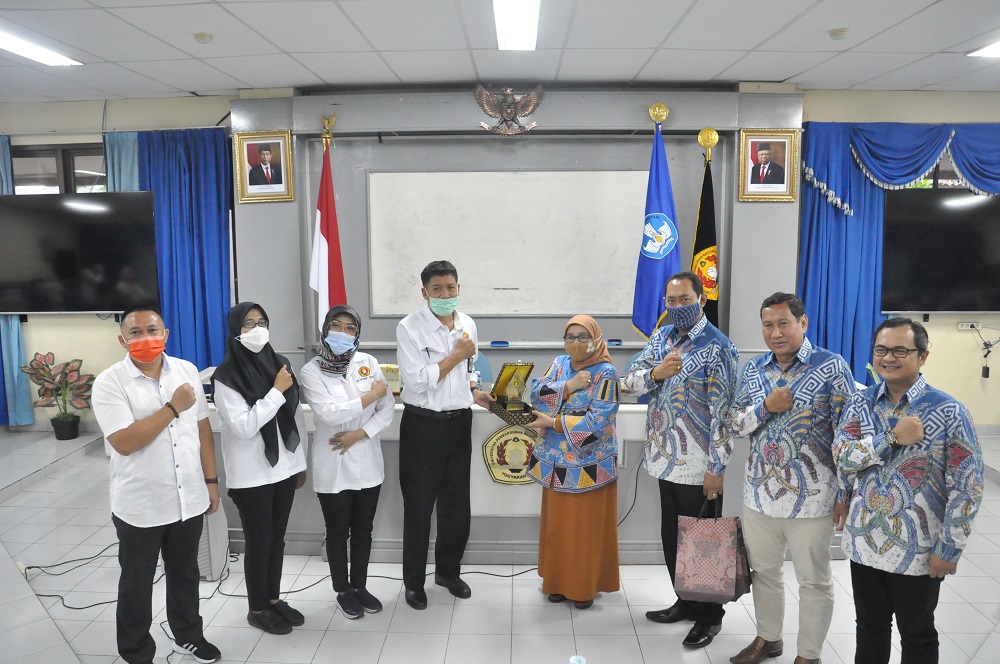Sleman - Faculty of Economics and Business (FEB), University of Bhayangkara (UBHARA) Surabaya got into an offline cooperation agreement to FEB Universitas Pembangunan Nasional “Veteran” Yogyakarta (UPNVY) at the Seminar room of the Faculty of Economics and Business, Campus 1 UPNVY. The cooperation agreement made on November 16, 2020 was signed by the Dean of FEB UPNVY Dr. Sujatmika, Drs., M.Si and the Dean of FEB UBHARA, Dr. Siti Rosyafah, Dra. Ec., MM with the aim of cooperation in the Tri Dharma of Higher Education. In addition, this Agreement in the Tri Dharma of Higher Education was held to realize the MBKM (Independent Learning-Independent Campus) program initiated by the Ministry of Education and Culture.
Dr. Sujatmika, Drs., M.Si as the Dean of FEB UPNVY welcomed the cooperation between FEB UPNVY and FEB UBHARA. There are many opportunities for the cooperation that can be done, such as in terms of utilizing the facilities and sharing information and knowledge owned by both parties. One of the collaborations that can be pursued is a student exchange program to implement PERMATA-SAKTI (Indonesian National Student Exchange Program-Credit Transfer System with Information Technology).
On the same occasion, Sri Suharsih, Dr., M.Si, as Deputy Dean I for Academic Affairs, FEB UPNVY, explained further about academics and curriculum at FEB UPNVY. Every two years, FEB UPNVY evaluates the curriculum at the Faculty to meet the changing times. In addition, she mentioned the realization of the MBKM curriculum on November 23, 2020 where the difference between the regular curriculum and the MBKM curriculum lies in its implementation.
Sri Suharsih added that the leading courses in UPNVY Accounting can be included in the student exchange program. The leading courses that can be included in PERMATA-SAKTI are General Mining Accounting, MSME and Cooperative Accounting, and Public Sector Performance Measurement. While the courses offered for student exchange programs across study programs are the Taxation course in which this course is not a prerequisite course that requires basic accounting.
Drs. R. Hendry Gusaptono, M.M. as Secretary of the Department of Management and Former Head of the Center for Community Service (Real Work Lecture) and TTG (Appropriate Technology) LPPM (Institute for Research and Community Service) explained about the KKN courses available at UPNVY. The KKN course at UPNVY is a compulsory 3 SKS course that is covered directly by the LPPM with the minimum requirement of taking 110 credits. KKN is held 3 periods during one academic year with the duration offered, namely a month of stay in the intermediate semester and the duration of three months of non-stay during the odd / even semester. Before carrying out KKN activities in the village, the students are given a week to survey the conditions of the problems that exist in the village. Having those existing problems, the students are assigned to solve problems by compiling and running work programs during the Community Service Program.
Continuing the discussion from R. Hendri Gusaptono, H. Sutopo, M.M. as Deputy Dean I for Academic Affairs, FEB UBHARA explained that KKN 2 SKS is not a compulsory subject with a minimum requirement of having taken 100 SKS. KKN at UBHARA only lasts 10-12 days to stay in the village. Apart from the KKN course, he mentioned that in the Accounting study program there are Forensic Accounting courses. Unlike the UPNVY case, in which his campus does not have human resources in the field of Forensic Accounting, he said that by having this collaboration, hopefully there will be a transfer of knowledge between FEB UBHARA and FEB UPNVY not only in courses, but also collaboration on research.
Sutopo hopes that UBHARA as a brotherhood within the scope of the State Defense Campus can catch up with UPNVY and hopefully the cooperation between FEB UBHARA and FEB UPNVY can run smoothly and not only in student exchanges, but also transfer of knowledge and research. Public Relations
Jl. SWK 104 (Lingkar Utara), Condongcatur, Yogyakarta 55283 (Kampus Pusat)
Jl. Babarsari 2 Yogyakarta 55281(Kampus Unit II) | Telp. +62 274 486733



